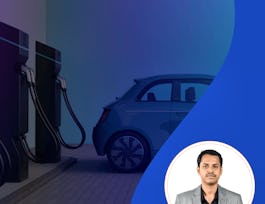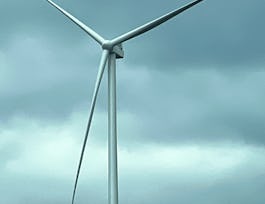“Electric Vehicle Sensors” starts with a discussion on how electric vehicles work differently from gasoline or diesel fuel powered vehicles and the major types of electric vehicles. It then moves to the unique components of full electric and hybrid electric vehicles, and how in-vehicle and external battery charging systems work. We reference all the sensors that are used for in-vehicle and outside unique components. Then we do a deep dive into how each of these sensors work.


Electric Vehicle Sensors
Taught in English
Recommended experience
What you'll learn
Examine traction motor, inverter, transmission and battery charging hardware
Specify the correct sensor for an electric vehicle application
Skills you'll gain
Details to know

Add to your LinkedIn profile
4 quizzes
See how employees at top companies are mastering in-demand skills


Earn a career certificate
Add this credential to your LinkedIn profile, resume, or CV
Share it on social media and in your performance review

There are 4 modules in this course
In this module you will learn about the major categories of electric vehicles that have been developed so far
What's included
7 videos2 readings1 quiz
In this module you will learn about the major electrical components in electrical vehicles
What's included
6 videos2 readings1 quiz
In this module you will learn about the battery chargers and modules and how high voltage and current is measured in these components
What's included
6 videos2 readings1 quiz
In this module students will learn about the technology behind torque and speed sensors and thermistors
What's included
5 videos2 readings1 quiz
Instructor

Offered by
Recommended if you're interested in Electrical Engineering

Coursera Instructor Network

University of Colorado Boulder

Google Cloud
Get a head start on your degree
This course is part of the following degree programs offered by University of Colorado Boulder. If you are admitted and enroll, your coursework can count toward your degree learning and your progress can transfer with you.
Why people choose Coursera for their career




Learner reviews
Showing 3 of 20
20 reviews
- 5 stars
60%
- 4 stars
25%
- 3 stars
5%
- 2 stars
0%
- 1 star
10%
Reviewed on May 21, 2023

Open new doors with Coursera Plus
Unlimited access to 7,000+ world-class courses, hands-on projects, and job-ready certificate programs - all included in your subscription
Advance your career with an online degree
Earn a degree from world-class universities - 100% online
Join over 3,400 global companies that choose Coursera for Business
Upskill your employees to excel in the digital economy
Frequently asked questions
Yes, you can preview the first video and view the syllabus before you enroll. You must purchase the course to access content not included in the preview.
If you decide to enroll in the course before the session start date, you will have access to all of the lecture videos and readings for the course. You’ll be able to submit assignments once the session starts.
Once you enroll and your session begins, you will have access to all videos and other resources, including reading items and the course discussion forum. You’ll be able to view and submit practice assessments, and complete required graded assignments to earn a grade and a Course Certificate.



